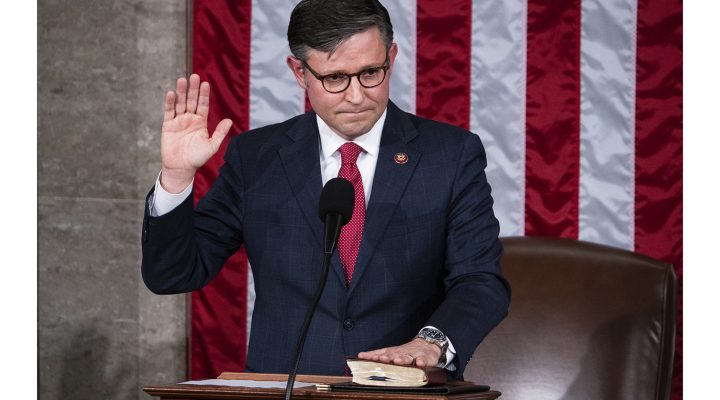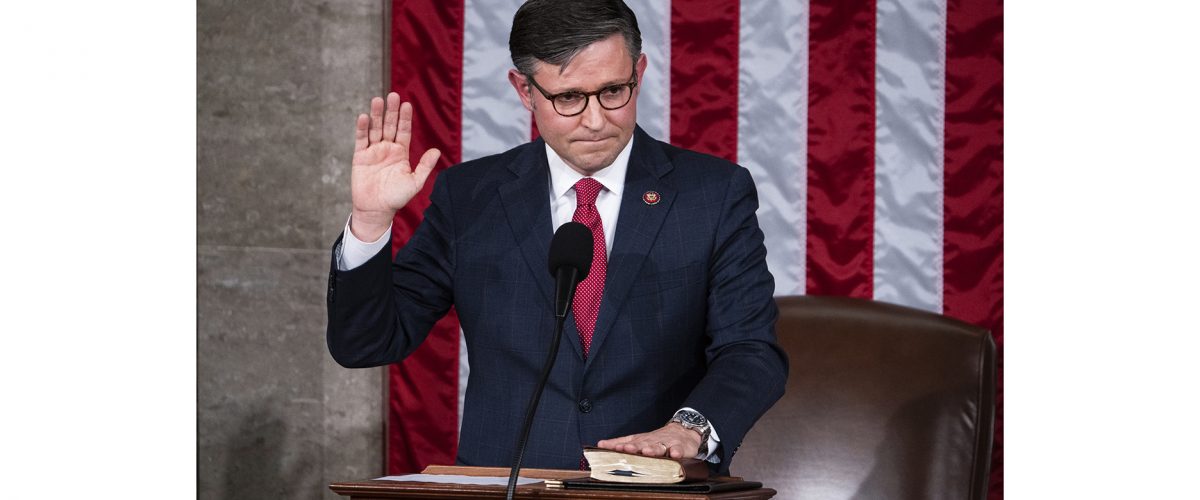It didn’t take long for Baptists who care about religious liberty to learn just how far astray Mike Johnson, the new speaker of the House, has drifted from our traditional support for church-state separation.
Based on his remarks from the dais after he was elected and his record of misleading statements prior to his election, my colleague Amanda Tyler issued a strong denunciation of Johnson’s ties to Christian nationalism.

Jennifer Hawks
“In his first act as speaker, Johnson claimed God gave each member of the U.S. House authority,” Tyler noted in a statement provided to Newsweek at the magazine’s request. “As a Christian, I reject Christian lawmakers using language that alienates and excludes lawmakers and Americans of different faiths from the political process. While it is common for people of faith to feel called to their vocations, Americans dedicated to religious freedom for all are understandably alarmed by elected officials claiming to be God’s chosen.”
The Associated Press also reached out to BJC for comment.
“Speaker Mike Johnson has an obligation to serve all Americans — people of all faiths and nonreligious Americans,” Tyler told the AP. “Speaker Johnson’s long track record of denying the institutional separation of church and state and promoting the myth that we were founded as a ‘Christian nation’ makes me doubt that he will be able to govern in a way that honors the U.S. Constitution’s promise of religious freedom for everyone. Johnson’s brand of Christian nationalism is bad American history and a betrayal of the historic Baptist commitment to religious freedom.”
“As both an ordained Baptist minister and a constitutional lawyer, I cannot stay silent when I see both our country’s Constitution and my Baptist heritage so misconstrued.”
BJC continues to speak out strongly because we are especially concerned when Baptists like Mike Johnson misportray our values in the public square. As both an ordained Baptist minister and a constitutional lawyer, I cannot stay silent when I see both our country’s Constitution and my Baptist heritage so misconstrued.
Regrettably, Speaker Johnson has continued to spread half truths about the separation of church and state in the weeks since his election.
“When the Founders set this system up, they wanted a vibrant expression of faith in the public square because they believed that a general moral consensus and virtue was necessary,” Johnson said in a new interview on CNBC. “The separation of church and state is a misnomer; people misunderstand it.”
He added: “Of course, it comes from a phrase that was in a letter that (Thomas) Jefferson wrote. It’s not in the Constitution. And what he was explaining is they did not want the government to encroach upon the church — not that they didn’t want principles of faith to have influence on our public life. It’s exactly the opposite.”
Speaker Johnson’s views come straight out of the pseudo-history pushed by the likes of activist David Barton. The Texas Tribune recently reported on their close ties, noting how widely described Barton’s views are by actual historians:
Barton, a self-styled “amateur historian,” has for years been debunked and ridiculed by actual historians and scholars,who note that he has no formal training and that his work is filled with selective quotes, mischaracterizations and inaccuracies — critiques Barton has claimed are mere attacks on his faith. He has been accused of whitewashing the Founding Fathers — particularly, their slave owning — to fit his narrative of a God-ordained nation. He has acknowledged using unconfirmed quotes from historical figures. And Barton’s 2012 book, The Jefferson Lies, was so widely panned by Christian academics that it prompted a separate book, Getting Jefferson Right, by Warren Throckmorton and Michael Colter to debunk all his inaccuracies, and was later pulled by its Christian publisher because “the basic truths just were not there.”
“Speaker Johnson’s views come straight out of the pseudo-history pushed by the likes of activist David Barton.”
BJC has spent decades countering Barton’s lies. J. Brent Walker, former executive director of BJC, published a rebuttal in 1995. Here’s a portion from the 2005 revision:
Barton mentions church-state separation as flowing from Thomas Jefferson’s 1802 letter to the Danbury Connecticut Baptist Association. He asserts that later in the letter Jefferson made it clear that he wanted only a “one directional wall” to prevent the government from harming religion, not to prevent religion from capturing the government.
A reading of the entire letter belies any suggestion that Thomas Jefferson thought it was “one directional.” There is absolutely nothing in the letter even to hint that that is the case. Indeed, to the degree that Jefferson’s notion was one-directional, most scholars would argue that he was more concerned with the church harming the state than vice versa.
Of course, Barton completely ignores Roger Williams’ reference 150 years earlier to the “hedge or wall of separation between the garden of church and the wilderness of the world.” It is clear that Williams, a Baptist pioneer, saw the advantage to the church of a clear boundary erected between itself and the state. More than that, he thought this wall was mandated by the very principles of Christianity.
You can read Walker’s full rebuttal to Barton and judge for yourself.
Our concern isn’t just about rhetoric about history. Johnson’s beliefs have an impact on public policy. One specific area of concern for religious freedom advocates is that Speaker Johnson has advocated for the repeal of the so-called Johnson Amendment, which protects the integrity of houses of worship and other 501(c)(3) organizations from partisan campaigning. Repealing the Johnson Amendment would expose our churches to pressure to endorse candidates, and it could turn all charitable nonprofits into de facto political action committees, undermining their independent witness and prophetic voice.
As Baptists, we have a responsibility to carry on the legacy of religious freedom advocacy that has shaped the American ideal of church-state separation. The institutional separation of both ensures that neither tries to perform or interfere with the mission and work of the other, and it allows religion to freely flourish in our society while ensuring no particular religious belief is required to be a full citizen of the United States. We have a particular obligation to speak out when the person second in line to the presidency is a Baptist and spreading a pseudo-history of the American founding to advance Christian nationalism.
Jennifer Hawks serves as associate general counsel at BJC (Baptist Joint Committee for Religious Liberty), where she provides legal analysis on church-state issues that arise before Congress, the courts and administrative agencies. She is a member of the U.S. Supreme Court, Texas and Mississippi bars.
Related articles:
Johnson called ‘the most unabashedly Christian nationalist speaker in history’
White Christian nationalism in a tailored suit | Opinion by Robert P. Jones


